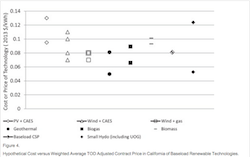According to a new report released today by the Union of Concerned Scientists (UCS), consumers and businesses are becoming increasingly vulnerable to higher electricity bills due to increased natural gas bills. As such, USC calls for more energy efficiency and renewable energy resources like solar and wind to be integrated into the U.S. grid. This would help insulate against economic risks tied to one energy source, while diversify the power energy mix.
“The Natural Gas Gamble,” finds that the power sector is leading the country into a danger zone by favoring natural gas over renewables and energy efficiency options.
“There’s a well-documented history of volatility in natural gas prices,” said Jeff Deyette, senior energy analyst at UCS and report co-author. “Increasing demand, extreme weather  events, and uncertainties about available gas supplies can cause prices to spike dramatically. For example, last winter when the Polar Vortex brought bitter cold to much of the U.S., prices in some regions jumped 10- to 12-times higher than recent lows. Despite the recent surge in natural gas production, these trends could continue and leave consumers that rely on natural gas paying the price.”
events, and uncertainties about available gas supplies can cause prices to spike dramatically. For example, last winter when the Polar Vortex brought bitter cold to much of the U.S., prices in some regions jumped 10- to 12-times higher than recent lows. Despite the recent surge in natural gas production, these trends could continue and leave consumers that rely on natural gas paying the price.”
The analysis also found that if renewables made up a much greater share of the U.S. electricity mix and were combined with investments in energy efficiency, electricity prices would stabilize and consumers would ultimately pay less for their energy. Factoring in the limit on carbon emissions and strong renewable energy and energy efficiency policies at both the federal and state levels, by 2040 renewables could make up nearly 40 percent of the electricity mix and consumers would see an annual net savings of $59 billion (in 2013 dollars).
“Businesses and shareholders may also see their bottom lines negatively affected if utilities continue to expand natural gas in their electricity mix,” Deyette added. “Cleaner-burning natural gas can help in the transition away from coal to cleaner electricity generation sources. However, simply substituting dependence on one fossil fuel for another is a dead end that ultimately limits our ability to slow climate change and safeguard consumers.”
The UCS report concludes that as the nation moves away from coal, enacting a breadth of policies to ensure a diverse supply of low-carbon power sources—made up primarily of renewable energy and energy efficiency, with a more balanced role for natural gas—would protect consumers’ pocketbooks and the environment.
 Our latest ZimmPoll asked the question, “Should Congress grant TPA?”
Our latest ZimmPoll asked the question, “Should Congress grant TPA?”








